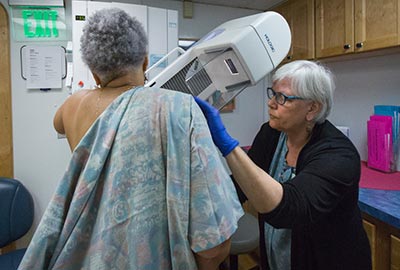PREVENTION IS BETTER THAN CURE, IF YOU BELIEVE THEN YOU HAVE TO READ THIS.
Prevention tips from Anne McTiernan, M.D., Ph.D., a member of Fred Hutch's Public Health Sciences Division and author of “Breast Fitness” (St. Martin’s Press):

Mammograms are recommended for breast cancer screening.
Photo by Robert Hood / Fred Hutch
For all women: Follow a healthy lifestyle.
Keep your weight in normal range (body mass index under 25), be physically active (at least 30 minutes a day of moderate-intensity exercise), minimize alcohol intake (one drink a day or less), and don’t smoke. Being overweight, inactivity and alcohol all increase risk for breast cancer, and smoking increases risk in some women.
For young women: Breast-feed your babies for as long as possible. Women who breast-feed their babies for at least a year in total have a reduced risk of developing breast cancer.

For postmenopausal women: Avoid hormone replacement therapy. Menopausal hormone therapy increases risk for breast cancer. If you must take hormones to manage menopausal symptoms, avoid those that contain progesterone and limit their use to less than three years. “Bioidentical” hormones and hormonal creams and gels are no safer than prescription hormones and should also be avoided.
For high-risk women: Consider taking an estrogen-blocking drug. Women with a family history of breast cancer or who have had breast biopsies or are over 60 should talk to their doctor about the pros and cons of estrogen-blocking drugs such as tamoxifen, raloxifene, and aromatase inhibitors.

SUPPORT OUR BREAST CANCER RESEARCH
DONATE TODAY
Screening and early detection tips
If you are over 40, get a mammogram. Early detection of breast cancer offers the best chance for a cure. SCCA supports the American Cancer Society’s recommendation that women begin annual mammography screening at age 40.
Know your risk. Tell your doctor if you have family members who have had breast cancer, especially a mother or sister, and if they had breast cancer before reaching menopause because your own risk of cancer may be higher than average. Some women at high risk may be recommended for annual MRI in addition to a screening mammogram.
Don’t put off screening because of discomfort or fear of the results: A mammogram should never be painful. To reduce discomfort, try to schedule the exam after your monthly period, when breast tissue is less sensitive. You may benefit by taking an over-the-counter anti-inflammatory such as ibuprofen or acetaminophen before your mammogram. Above all, tell the mammography technologist about any discomfort you may be experiencing. Most abnormalities found after a mammogram are not cancer. However, in some cases you may be called back for more tests, such as additional mammography or ultrasound screening, to confirm that the area on the screening mammogram is normal.
Treatment tips from Julie Gralow, M.D., director of Breast Medical Oncology at Seattle Cancer Care Alliance and co-author of “Breast Fitness” (St. Martin’s Press):
Breast cancer survivor Amy Anderson
Breast cancer survivor Amy Anderson with her children in their Seattle-area home.
Photo by Robert Hood / Fred Hutch
Choose your doctor wisely. Breast cancer specialists who work at dedicated cancer centers offer specific expertise as well as access to the latest treatments that are part of clinical studies. Such centers can provide other specialty services, usually under one roof, such as physical therapy, nutrition and social work.

Get specifics on your diagnosis and treatment. Bring someone with you to your appointments and bring questions in writing. Ask for copies of your test results and keep a notebook of all these results. Keep a list of questions that arise between visits so you don’t forget, and take notes of the answers. Above all, make informed decisions; learn as much as you can about your diagnosis and treatment.
Get good nutrition and bone up on bone health. Cancer treatment may influence taste and smell, and it may alter your digestion. Foods that you normally enjoy may not taste good during treatment while, paradoxically, foods that normally don’t appeal to you might taste better. You may have more energy and less nausea if you eat smaller amounts of foods more frequently rather than eating three big meals per day. Eat more vegetables, fruits, whole grains, nuts, seeds and legumes such as black beans and lentils. Choose a rainbow of colorful whole foods (like deep greens of spinach, deep blues of blueberries, white for onions, and so on) to ensure that you get a variety of anti-cancer nutrients. Alcohol is usually not preferred or recommended during treatment. Keeping your bones healthy throughout your life is important; however, if you’re a woman who’s been diagnosed with breast cancer, bone health is especially important. Research shows that some breast cancer treatments can lead to bone loss. Plus, women are about twice as likely as men to develop osteoporosis after age 50. Talk to your health care team about specific recommendations for keeping bones healthy, such as taking calcium and vitamin D, and doing weight-bearing exercises to help keep bones strong.
Survivor tips from Karen Syrjala, Ph.D., director of Biobehavioral Sciences in the Fred Hutch's Clinical Research Division and co-director of the Survivorship Program:

blueberries and strawberries
Photo by featurePics Stock
Get a summary of your treatments. Have a list of what surgery, radiation and chemotherapy doses you received so that you can communicate these to your primary care providers. This will help you plan for the next tip on the list.
Make a survivorship plan. Talk to your oncologist about recommended follow-up care, including potential long-term effects of your cancer treatment and what to watch out for. For example, some cancer treatments can increase the risk of cardiovascular problems or second cancers; others can impact your bones.
Learn how to manage the fear of cancer coming back. First, find out your risk of recurrence from your health care provider. Second, remember that risk is an estimate based on averages and does not always apply to you as an individual. Third, consider counseling or other assistance to help you face your fears and move forward.